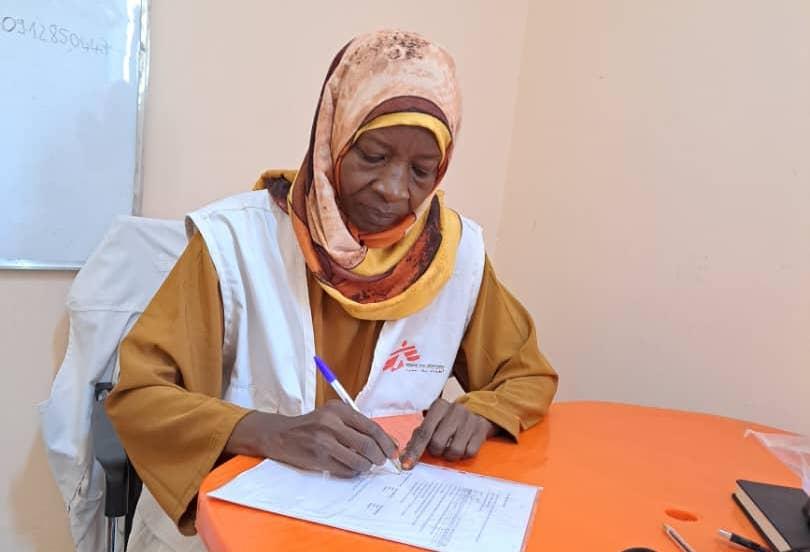Aisha worked with MSF in the White Nile state camps in 2020. She came back to support our activities this June, when MSF restarted offering assistance as a response to the crisis aggravated by the conflict. After the conflict in Sudan started in April 2023, the refugee camps in White Nile state have received more and more people every day. Most of the people arriving have been displaced by the fighting in the capital Khartoum. As a health promoter, Aisha's work focuses on health education, identifying the social aspects of people´s needs and community engagement.
I can´t find the right words to describe the conditions people are living in. I´ve witnessed women giving birth and caring for their newborns in overcrowded and overheated tents, without access to clean water or proper sanitation.
I´ve been here before, back in 2020, and even then, the White Nile refugee camps were already struggling to meet the basic needs of people. Now, five months into the conflict, with nearly half a million internally displaced people and refugees living across ten camps in the White Nile, the situation has reached a critical point. People have lost their jobs and livelihoods, and what makes it even worse is that no one knows when this situation will end.
As a health promoter, my job is to provide health education, identify the social aspect of people´s needs – and most importantly engage with the community by listening to stories of individuals. I want to share one of those stories with you.
In the Alagaya camp, the second largest refugee camp in the White Nile state, I met a mother of three who had fled the conflict in Khartoum. Her youngest child was suffering from malnutrition, and it was clear to the doctors that we would need to refer the child to a hospital outside the camp for proper treatment. However, it´s common for mothers to be reluctant to leave their families and children to make the trip, and she was no exception.
I spent hours talking to her, explaining the benefits of taking her child to the hospital, assuring her that MSF would provide transportation and medication. She hesitated because she didn't want to leave her other two children in the camp. Once we assured her that she would be able to travel with all her children, she eventually agreed, and went to gather her belongings.
Upon her return, to my surprise, not only one but all her children were sick. I asked her why she hadn´t informed us about the state of the other two children, and it turned out she thought we wouldn´t provide care for all of them. Eventually, we managed to arrange referrals to the hospital for all her children.
I, too, am an internally displaced person, and I understand the struggles of the community on a personal level. Balancing my role as a health promoter with my own experiences can be challenging. I listen to the stories of the people here, and I'm reminded that everyone has their personal experience.
Despite the volume of work, we are doing to provide humanitarian assistance in three camps, it´s not easy and the needs are huge. But I'm grateful to have a strong team by my side, and I appreciate the dynamic of the team in which I feel supported – everyday.
In June 2023, MSF teams in Sudan started supporting the provision of primary healthcare in three Ministry of Health (MoH) run clinics in the White Nile state camps of Um Sangour, Al Alagaya and Khor Ajwal, which hosts Sudanese population displaced from Khartoum. MSF teams are providing general healthcare, assisting patients with medical referrals, treating suspected measles cases, and supporting the inpatient therapeutic feeding centre at the hospital outskirts of the Al Kashafa refugee camp.
The camps urgently need scaled-up assistance: by the end of July 2023 the population of the camps had increased by almost half - from 290 000 refugees’ pre-conflict to 428 000 people. As more people are arriving – to the already overcrowded camps and surrounding areas &, internally displaced people are struggling to receive assistance and resources and are setting up on the outskirts of the refugee camps, mostly hosting South Sudanese refugees. The assistance offered in the camps falls short of meeting the needs of the high number of people requiring medical and humanitarian aid.
